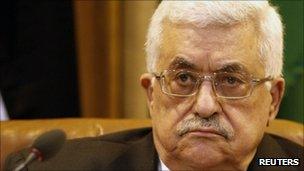US walking tightrope over Palestinian UN statehood bid
- Published
- comments

Mahmoud Abbas has been pushing for state-level access to the UN for months
NEW YORK - Each year the world's leaders assemble here for the United Nations General Assembly.
The speeches are often preachy, and dull, and the organisation's protocol demands that around 190 of these addresses get delivered.
This year there is a prospect of a real diplomatic crisis at the meeting - the Palestinian desire to upgrade their UN membership could produce a showdown.
Mahmoud Abbas, president of the Palestinian National Authority, has been pushing the case for state-level access to the UN for some months.
His supporters see it was a way of by-passing an obstructive, right wing, Israeli coalition while advancing the aspirations of his people.
The Israelis obviously do not want to see the Palestinians put on a parity - not until there is a negotiated two state solution in any case.
Upsetting the applecart
But the more interesting manoeuvring is going on between the Palestinians and the United States. The Americans, of course, have long shielded Israel from hostile votes in the UN Security Council, where they have veto power, but they are nervous that Mr Abbas' move may upset the regional applecart as well as years of Middle East diplomacy.
Colin Powell, the former US secretary of state, told us in his Newsnight interview, external last week that pushing the case for full UN membership was unlikely to advance the cause of Palestinian statehood.
Former UK Prime Minister Tony Blair in his role as Quartet peace envoy, has also tried to dissuade the Palestinians from doing it.
The Quartet though is split on this issue, since Russia, part of the group, backs Mr Abbas, and so is the European Union.
One diplomat I spoke to at the UN predicted that EU countries could vote four different ways if it came to it - yes, no, abstain, or absenting themselves entirely from the process entirely.
Arab Spring effect
Arab countries, emerging from a meeting in Cairo on Tuesday, picking up the mood of the street (the Israeli embassy in the Egyptian capital was stormed at the weekend), are vying with one another to express support for the UN vote.
In playing to the gallery of a Middle East public that feels newly empowered, countries that had been considered "pro-Western" like Turkey and Qatar have been urging the Palestinians to take their case to the UN Security Council.
Those who are urging this route upon Mr Abbas seem to be daring the US to veto a resolution. The consequences of doing this, in terms of the Arab Spring taking an anti-American turn, could be profound.
US diplomats seem to feel confident that the Palestinian president will tread a middle path between those who seek to have the confrontation, and those who recognise that American involvement in any Israeli-Palestinian peace process is vital, apart from anything else bank-rolling many aspects of government in the Palestinian Territories.
The assumption on the part of many here is therefore that the Palestinians will move their resolution in the General Assembly, which includes the entire UN membership and in which no countries have veto powers.
If Mr Abbas goes this route it will be primarily for political effect, since he is likely to get a hefty vote of support, but the consequences would be largely symbolic.
Public mood
However, even a vote in the General Assembly could cause all sorts of aftershocks. The chairman of the House Foreign Relations Committee on Capitol Hill, Ileana Ros-Lehtinen, has introduced a bill to cut off US funding to any UN body that recognised the Palestinians as having national status, external.
What does all this tell us? That Arab leaders who struggle to respond to public opinion (including Mr Abbas) are increasingly re-writing the rules of Middle East diplomacy.
The Americans too are trying not to get on the wrong side of that tide of change, but it will take deft political footwork for them to deflect Palestinian ambitions without being blamed for it across large parts of the Arab world.